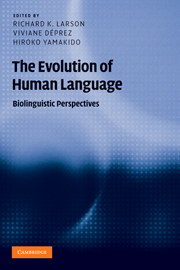Book contents
- Frontmatter
- Contents
- Figures
- Contributors
- Acknowledgments
- Introduction
- 1 The faculty of language: what is it, who has it, and how did it evolve?
- Part I Language architecture
- Part II Language and interface systems
- 6 Prospection as a cognitive precursor to symbolic communication
- 7 Did language evolve before speech?
- 8 A pragmatic perspective on the evolution of language
- Part III Biological and neurological foundations
- Part IV Anthropological context
- Notes
- References
- Index
8 - A pragmatic perspective on the evolution of language
Published online by Cambridge University Press: 05 June 2012
- Frontmatter
- Contents
- Figures
- Contributors
- Acknowledgments
- Introduction
- 1 The faculty of language: what is it, who has it, and how did it evolve?
- Part I Language architecture
- Part II Language and interface systems
- 6 Prospection as a cognitive precursor to symbolic communication
- 7 Did language evolve before speech?
- 8 A pragmatic perspective on the evolution of language
- Part III Biological and neurological foundations
- Part IV Anthropological context
- Notes
- References
- Index
Summary
Suppose you overhear someone of whom you know nothing say, “It was too slow.” You have no problem understanding the sentence, but how much does that help you understand what the speaker means in uttering it? Very little. You don't know what the pronoun “it” refers to, what time span is indicated by this use of past tense “was,” and from what point of view “it” was “too slow.” The speaker might have uttered this sentence in order to convey an indefinite variety of meanings, for example, that the chemical reaction in the lab that afternoon had been too slow compared to what she had expected, that the decrease in unemployment had been too slow in France when Jospin was Prime Minister to help him win the presidential election, or that Jack's car was too slow (and so, last weekend, they had borrowed Peter's).
“It was too slow” is an ordinary sentence. Most – arguably all – sentences of any human language likewise underdetermine their interpretation. The grammar of a language, even if taken to include not only syntax but also phonology and semantics, does not, by itself, provide a sufficient basis for understanding utterances. To do this, humans do not just associate a linguistic meaning to the sound of a sentence; they also use information on the speech situation, the interlocutors, their past interactions, the background knowledge they share, and so on. Without this contextualization, an utterance provides just fragments of meaning without a definite import.
Information
- Type
- Chapter
- Information
- The Evolution of Human LanguageBiolinguistic Perspectives, pp. 124 - 132Publisher: Cambridge University PressPrint publication year: 2010
Accessibility standard: Unknown
Why this information is here
This section outlines the accessibility features of this content - including support for screen readers, full keyboard navigation and high-contrast display options. This may not be relevant for you.Accessibility Information
- 15
- Cited by
